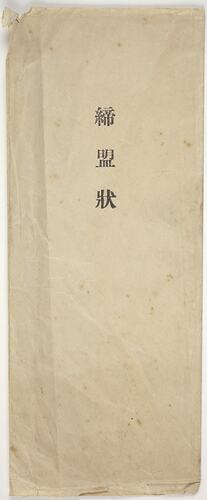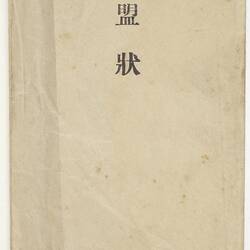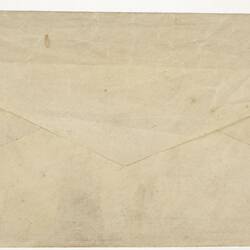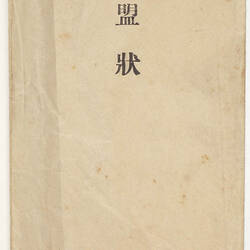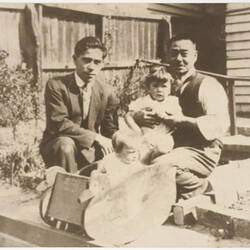Summary
Envelope addressed to Setsutaro Hasegawa, from the Japanese Red Cross in recogintion of Setsutaro becoming a full time staff member of the Red Cross on 15th December 1926. The letter contained in the envelope is also in the collection (HT 22204).
Setsutaro migrated to Australia from Japan in 1897 at the age of 26, just four years before the introduction of the Immigration Restriction Act which severely limited migration to Australia from countries in Asia. He established a laundry business in Geelong and by 1911 he had married an Australian-born woman and had three children.
In 1941 Setsutaro was arrested as an enemy alien and sent to Tatura internment camp in northern Victoria. Released early in 1943 due to his age and poor health, unlike most Japanese interns he was not deported to Japan after the War. Setsutaro remained in Geelong for the rest of his life and died in 1952.
Founded in 1887 the Japanese Red Cross Society is traditionally supported by the Imperial Family of Japan with Empress as Honorary President and other royal family members as Vice-Presidents. Since its inception the Japanese Red Cross Society has undertaken disaster relief activities, conducted training for health professionals and the general public, established and run hospitals and blood banks, worked to improve social welfare, conducted safety training courses and been involved in educating the general public about international humanitarian rights, obligations and laws.
Physical Description
Paper envelope with three Japanese characters in black on front.
Significance
The Hasegawa collection enables the exploration of a number of important historical themes relating to migration, working life, and wartime internment in Victoria. Late nineteenth century and early to mid twentieth century Japanese migration and settlement experiences are little represented in the museum's collections and this collection of clothing, documents, personal items and photographs helps to redress.
More Information
-
Collecting Areas
-
Acquisition Information
Donation from Andrew Hasegawa, Andrew Hasegawa, 08 Feb 2008
-
Presented By
-
Presented To
Mr Setsutaro Hasegawa, Geelong, Victoria, Australia, Dec 1926
-
Classification
Migration, Settlement - cultural & social life, Correspondence
-
Category
-
Discipline
-
Type of item
-
Overall Dimensions - Folded
91 mm (Width), 226 mm (Height)
-
References
5 family photographs (need originals from donor to scan)
-
Keywords
Charities, Correspondence, Immigration, Immigration Policies, Japanese Communities, Japanese Culture, Japanese Immigration
